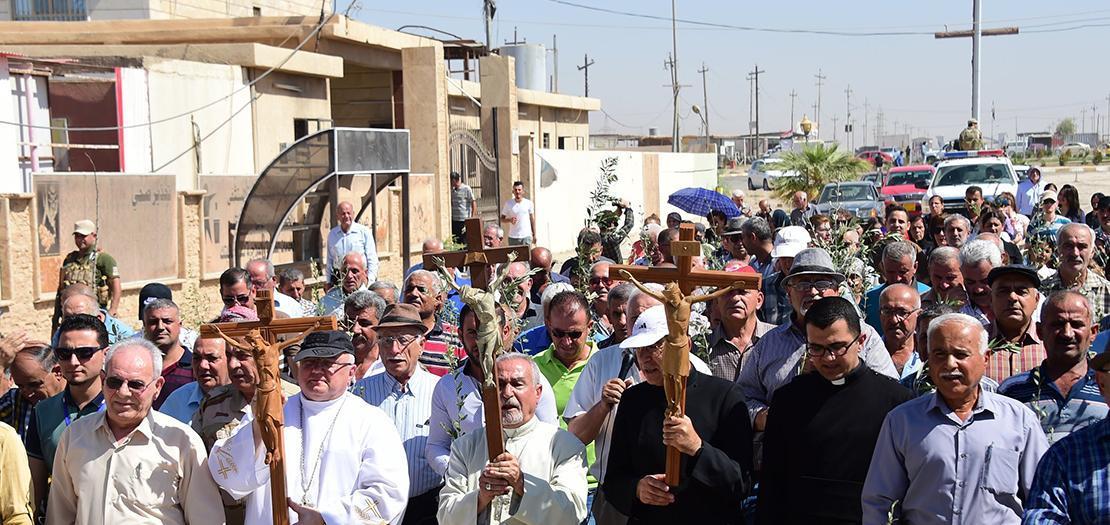Issued by the Catholic Center for Studies and Media - Jordan. Editor-in-chief Fr. Rif'at Bader - موقع أبونا abouna.org
The 10th anniversary of the forcible displacement of the Christians of Mosul
These days mark the 10th anniversary of the forcible displacement of Christians from Mosul and the rest of the Nineveh Plain in Iraq. It was in the first place an internal displacement to Erbil and the rest of Kurdistan, and then to neighboring countries, especially to beloved Jordan and brotherly Lebanon. These are the two countries that had received the forcibly displaced from Syria years earlier.
Many memories are invoked of the year 2014, as I cooperated at the time with Caritas Jordan to receive one group after the other of Christians from Mosul who, in the blink of an eye, left the free and dignified life in their country to places, halls, complexes and caravans. I was an eyewitness of the harsh life they accepted as a result of ISIS’ forcible displacement. So far, no one has so far comprehended what happened, as if it were a “midsummer night’s dream” or a horrible nightmare. Yet, it was neither a dream nor a nightmare, but rather a painful and harmful reality for the Iraqi national fabric, or even for the Christians and Muslims of the East together who have lived together for hundreds of years, sharing the same hardships, and overcoming them with a new hope every time.
This contemporary forcible displacement has been harsh, as the number of Christians in Iraq declined from one-and-a-half million to a few hundred thousand people (there are no accurate statistics), who are still patient and struggling to maintain the common living that served as model in entire Levant and Mesopotamia. Imagine that we are talking about the 21st, where there are still those who forcibly displace an entire people based on their ethnic or religious affiliation.
This statement leads me to laud what my noble country, Jordan, has done, which has been rightly, deservedly, and par excellence called the “hosting country”, despite the daily escalating difficulties that have increased due to the lack of sufficient support from the countries of the world and from the United Nations for Jordan that hosted waves of emigrants one after the other, and one disaster after another.
Yet, Jordan hosted the forcibly displaced from Mosul and provided them with everything possible in terms of food, drink, medical assistance, psychological care, and schooling for children. Jordan also provided them with what they were deprived of and for which they were forcibly displaced, as the churches opened their doors and considered the arrivals as part of the vibrant, vital, and historical Christian community in Jordan. Children were baptized here, adults were married in the churches of Jordan, and priests held requiem masses for the dead in a manner befitting human dignity and faith. Churches were also consolidated in Jordan, such as the Syriac Church, with its two branches, the Orthodox and Catholic, and the Chaldean Church.
After ten years, we say that many Iraqis have left Jordan and settled in distant places such as Australia, Canada, the United States, and several European countries. We wish them all the best and convey blessings to them. We also have several means of communication with them, and they do not hesitate to say prayers of thanks to the Lord for the blessing of life and salvation, and appreciation for Jordan with its Hashemite leadership as well its kind and hospitable people. We pray that the doors of hope will be opened for those who remained in Jordan and are still waiting for a solution for a better life, and a clear future for their children, as many of them still remain in Jordan, as they do not want to return to their mother country, Iraq. Yet, the world countries no longer want to welcome them while they have no possibility to work in Jordan. So after ten years, we turn our attention to them with hopes for a beautiful future.
Last year, I visited the religious tourist city of Lourdes in southwestern France, where I appreciated the eagerness of a family coming from Australia who sought the grotto of Virgin Mary there. When this family members learned from social media that I was there, they came and greeted me warmly. This family was one of the forcibly displaced families from Mosul who lived in Jordan for a year-and-a-half. After that, they were lucky enough to go to Australia and after obtaining their new citizenship, they came to a religious grotto to thank God for the blessing of salvation.
They told me that the town and church of Na’our, which was their shelter, had imprinted in them a noble and refined image of dear Jordan. The appreciation and gratitude they expressed for this place and the people, abounding with kindness, are indelible as they were overwhelmed with kindness, and received encouragement on the first day of their violent and inhumane displacement.
It is really a painful memory. May this event serve as a memory and not repeat again.







